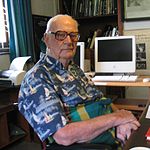Portal:Speculative fiction/Selected biography/21
Sri Lankabhimanya Sir Arthur Charles Clarke, CBE, FRAS (16 December 1917 – 19 March 2008) was a British science fiction author, inventor, and futurist, most famous for the novel 2001: A Space Odyssey, written in collaboration with director Stanley Kubrick, a collaboration that also produced the film of the same name; and as a host and commentator in the British television series Mysterious World. For many years, Robert A. Heinlein, Isaac Asimov, and Arthur C. Clarke were known as the "Big Three" of science fiction.
Clarke emigrated to Sri Lanka in 1956 largely to pursue his interest in scuba diving, and lived there until his death. He was knighted by the British monarchy in 1998, and was awarded Sri Lanka's highest civil honour, Sri Lankabhimanya, in 2005.
While Clarke had a few stories published in fanzines, between 1937 and 1945, his first professional sales appeared in Astounding Science Fiction in 1946: "Loophole" was published in April, while Rescue Party, his first sale, was published in May. Along with his writing Clarke briefly worked as Assistant Editor of Science Abstracts (1949) before devoting himself to writing full-time from 1951 onward. Clarke corresponded with C. S. Lewis in the 1940s and 1950s and they once met in an Oxford pub, The Eastgate, to discuss science fiction and space travel. Clarke, after Lewis's death, voiced great praise for him, saying the Ransom Trilogy was one of the few works of science fiction that could be considered literature.

